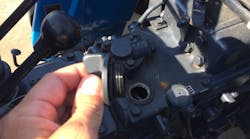Hydraulic systems used to transmit power efficiently over relatively short distances are complex and precise machines. Using the right hydraulic fluid is essential to achieving the optimum performance and lifetime from the system. But how do you know which is the correct fluid to use?
Unfortunately many applications for hydraulic equipment are different and there are many differences between hydraulic systems, so choosing the right fluid is not easy. In addition to the type of equipment, the severity of the duty cycle and the operating temperature range are important factors.
The first selection criterion is the type of pump. Vane pumps provide a steady fluid flow but can suffer high rates of wear between the vanes and the cam ring if a suitable antiwear oil is not used. Piston pumps are more durable and can produce much higher operating pressures but are relatively complex and expensive. Gear pumps are less expensive, easier to lubricate, and can cope with higher amounts of contamination, but are the least efficient and can only provide relatively low pressures.
Hydraulic equipment used indoors under normal service conditions generally use a conventional antiwear hydraulic oil with the appropriate viscosity. The most commonly used viscosities are ISO 32, 46, or 68, since these are able to lubricate and protect the system under the normal range of operating temperatures. Fluid viscosity should be low enough to optimize energy efficiency and fluid flow while high enough to minimize wear and optimize servo-valve operation. The viscosity should ideally be between 160 and 13 cSt over the operating temperature range, as many equipment manufacturers recommend this range of viscosity for full-load operations.
Hydraulic equipment used outdoors—the majority of hydraulic systems—have different challenges. These systems tend to have higher pressures, more severe duty cycles, and more extreme operating temperatures, in addition to having to cope with water, dust, and dirt. The hydraulic fluid needs to function well at low temperatures for easy start-up during winter while maintaining sufficient viscosity at high temperatures to protect during severe duty or in the summer.
The ideal hydraulic fluids for these applications have a higher viscosity index (VI) than a conventional antiwear fluid, much like a multigrade engine oil. Conventional hydraulic fluids generally have a VI of around 100. By comparison, a multigrade hydraulic fluid should have a VI of at least 140. There are fluids with a VI higher than 200 for use in temperature extremes where the viscosity must remain steady.
Antiwear Fluid Benefits
There are several benefits of using a good-quality, high-VI antiwear fluid, including maintaining a more consistent viscosity as temperature changes so the system continues to perform properly; having improved cold-weather operation so the equipment experiences fewer problems with cavitation, sluggishness, drift or shudder; and maintaining viscosity at high temperatures to protect system components and maintain overall efficiency. These fluids also provide greater mechanical and volumetric effectiveness, which improves energy efficiency and reduces fuel consumption and can be used year-round without needing to be changed.
Most hydraulic fluids are based on good-quality mineral oils, containing appropriate antiwear, oxidation and corrosion inhibition, antifoam and, if required, VI-improving additives. Synthetic oils may provide better oxidation stability but are significantly more expensive.
Occasionally special applications require special hydraulic fluids. Environmentally sensitive applications (forestry, agriculture, horticulture) may need to use biodegradable hydraulic oils: vegetable oil based for low pressures and temperatures or synthetic esters for higher pressures and temperatures. Where there are fire or explosion hazards (underground coal mines, steel works, glass-making), fire-resistant fluids are likely to be required: water-based fluids for low pressures and temperatures or phosphate esters for higher pressures and temperatures. Finally it is very important to follow hydraulic equipment manufacturers’ or major users’ specifications or recommendations.
When choosing a hydraulic fluid, ask the supplier if it is approved or recommended by the equipment manufacturer. Also ask for performance information against the international or national specifications. The fluid should be delivered clean and water-free so it will perform at its best. It’s very important to conduct used oil analysis as recommended by the supplier to determine when the oil may need maintenance or replacing.
David Whitby is chief executive of Pathmaster Marketing Ltd. in Surrey, England. You can reach him at [email protected]. This article first appeared in Tribology & Lubrication Technology (TLT), the monthly magazine of the Society of Tribologists and Lubrication Engineers, an international not-for-profit professional society headquartered in Park Ridge, Ill.

